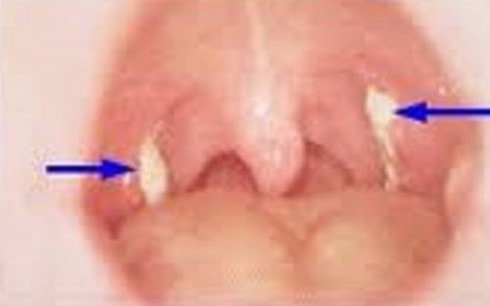Deadly complications of diphtheria
Diphtheria is common with typical symptoms such as mild fever, sore throat, cough, hoarseness, loss of appetite. The disease can be cured or fatal.
Recently, a diphtheria outbreak occurred in Binh Phuoc, killing 3 people. The media department had an interview with Professor, Doctor, Doctor Nguyen Thanh Bao - Department of Microbiology, University of Medicine and Pharmacy Hospital, Ho Chi Minh City.on diphtheria related issues.
For nearly half a month now, a strange disease has appeared in two communes, Thuan Loi and Thuan Phu, Dong Phu district, Binh Phuoc province, killing three people and requiring dozens of others to be hospitalized with fever and sore throat, causing great panic among the public in the area.
According to the report of Binh Phuoc Department of Health, up to now, in the area of Thuan Loi and Thuan Phu communes, there have been 29 cases hospitalized with fever and tonsillitis, of which three people have died, six have been discharged, and the remaining 20 are being treated at hospitals in and outside the province. Many patients with the disease said that their symptoms were fever, cough, and upper respiratory tract infection.
 |
| Diphtheria patient. |
Professor, Doctor, Doctor Nguyen Thanh Bao, Department of Microbiology, University of Medicine and Pharmacy Hospital, Ho Chi Minh City, stated: diphtheria is an acute infectious disease caused by diphtheria bacteria. Any subject exposed to the pathogen can get diphtheria. Usually, children from 1 to 10 years old are most affected because the antibodies passed on from the mother are no longer there, and low immunity will make them more susceptible to the disease.
The outbreak does not have a clear season, as long as there is a source of infection, it will be infected. Diphtheria bacteria are most commonly found in pharyngitis. Pharyngitis creates a false membrane in the throat. When the patient coughs or sneezes, the bacteria will spread around through the air or through contact with the skin when scratched, leading to the spread of diphtheria bacteria.
Many dangerous complications
Diphtheria is a toxic infection caused by diphtheria bacilli. The bacteria secrete exotoxins that damage many tissues and organs of the body.
The disease can be transmitted directly from sick people to healthy people through the respiratory tract or indirectly through toys and objects. Diphtheria bacteria can penetrate through damaged skin causing cutaneous diphtheria. After about 2 weeks of infection, the patient can infect others.
Diphtheria is often accompanied by typical symptoms such as mild fever, sore throat, cough, hoarseness, and loss of appetite. After 2-3 days, pseudomembranes appear on the back or sides of the throat, which are ivory-white, gray, or black. The pseudomembranes are tough, sticky, and bleed easily. This is the most important sign to detect the disease.
Patients may have difficulty breathing or swallowing. The disease may resolve or worsen and result in death within 6-10 days. Severe cases do not have a high fever but have signs of neck swelling, hoarseness, difficulty breathing, heart rhythm disturbances, and paralysis.
People with diphtheria, if not detected and treated promptly, will lead to myocarditis, damage to the heart muscle's conduction nervous system, and sudden death due to cardiovascular collapse. Some patients have myocarditis and heart valve inflammation, which after many years causes chronic heart disease and heart failure. In addition, the disease can also lead to kidney degeneration, renal tubular necrosis, medullary and adrenal cortex hemorrhage.
Dr. Nguyen Thanh Bao said:The main symptoms of diphtheria are sore throat. Diphtheria bacteria will create a white pseudo-membrane due to the inflamed cell layers that form a film that sticks to the inside of the throat. If not treated, the film will spread to cover the respiratory tract, causing suffocation for the patient. Unlike other common bacteria, diphtheria bacteria cause sore throat, fever, and are dangerous because of the toxins of the bacteria. The toxins will follow the blood and affect the main organs of the body, can cause heart inflammation, kidney inflammation or affect the nervous system causing paralysis of the arms, legs, strabismus, and the voice can change due to lisping of the larynx.
How to prevent
Dr. Nguyen Thanh Bao recommends: For people infected with diphtheria, it is necessary to isolate the patient for at least 2 days after appropriate antibiotic treatment and wear a mask when in contact. In addition, it is necessary to clean the room, personal belongings, toys, etc. with antiseptic solution.
The best way to prevent disease is to vaccinate children. Children should be vaccinated 3 times at birth, 1 month apart, then 1 year later and again after 5 years.
For diphtheria, after detecting the disease, to prevent the symptoms of bacterial toxins, the patient will be injected with diphtheria antitoxin (Serum Anti Diphtheriae - SAD) to neutralize the bacterial toxins, preventing the toxins from affecting the heart, kidneys and other nervous systems. Then the patient will be prescribed antibiotics such as Penicillin, Ampicillin, Erythromycin, Rifampycin, Clindamycin, Cephalosporin... But Penicillin is most commonly used. Dr. Nguyen Thanh Bao advises that when people have sore throats, they should see a doctor for appropriate treatment. If a white pseudomembrane is found in the throat during examination, the patient should be injected with antitoxin to prevent complications./.
According to VOV
| RELATED NEWS |
|---|
